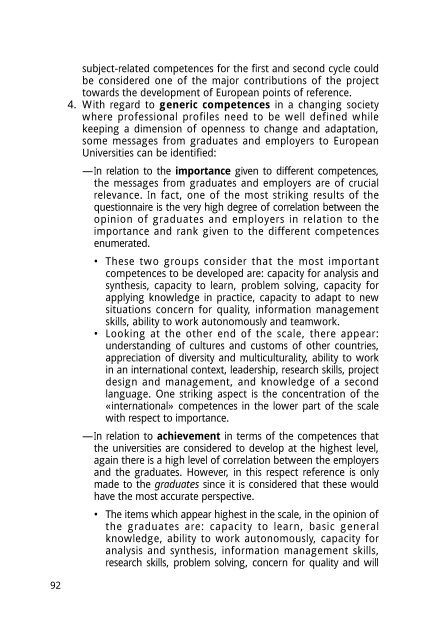Final Report Pilot Project - Relaciones Internacionales de la ...
Final Report Pilot Project - Relaciones Internacionales de la ...
Final Report Pilot Project - Relaciones Internacionales de la ...
You also want an ePaper? Increase the reach of your titles
YUMPU automatically turns print PDFs into web optimized ePapers that Google loves.
92<br />
subject-re<strong>la</strong>ted competences for the first and second cycle could<br />
be consi<strong>de</strong>red one of the major contributions of the project<br />
towards the <strong>de</strong>velopment of European points of reference.<br />
4. With regard to generic competences in a changing society<br />
where professional profiles need to be well <strong>de</strong>fined while<br />
keeping a dimension of openness to change and adaptation,<br />
some messages from graduates and employers to European<br />
Universities can be i<strong>de</strong>ntified:<br />
—In re<strong>la</strong>tion to the importance given to different competences,<br />
the messages from graduates and employers are of crucial<br />
relevance. In fact, one of the most striking results of the<br />
questionnaire is the very high <strong>de</strong>gree of corre<strong>la</strong>tion between the<br />
opinion of graduates and employers in re<strong>la</strong>tion to the<br />
importance and rank given to the different competences<br />
enumerated.<br />
• These two groups consi<strong>de</strong>r that the most important<br />
competences to be <strong>de</strong>veloped are: capacity for analysis and<br />
synthesis, capacity to learn, problem solving, capacity for<br />
applying knowledge in practice, capacity to adapt to new<br />
situations concern for quality, information management<br />
skills, ability to work autonomously and teamwork.<br />
• Looking at the other end of the scale, there appear:<br />
un<strong>de</strong>rstanding of cultures and customs of other countries,<br />
appreciation of diversity and multiculturality, ability to work<br />
in an international context, lea<strong>de</strong>rship, research skills, project<br />
<strong>de</strong>sign and management, and knowledge of a second<br />
<strong>la</strong>nguage. One striking aspect is the concentration of the<br />
«international» competences in the lower part of the scale<br />
with respect to importance.<br />
—In re<strong>la</strong>tion to achievement in terms of the competences that<br />
the universities are consi<strong>de</strong>red to <strong>de</strong>velop at the highest level,<br />
again there is a high level of corre<strong>la</strong>tion between the employers<br />
and the graduates. However, in this respect reference is only<br />
ma<strong>de</strong> to the graduates since it is consi<strong>de</strong>red that these would<br />
have the most accurate perspective.<br />
• The items which appear highest in the scale, in the opinion of<br />
the graduates are: capacity to learn, basic general<br />
knowledge, ability to work autonomously, capacity for<br />
analysis and synthesis, information management skills,<br />
research skills, problem solving, concern for quality and will


